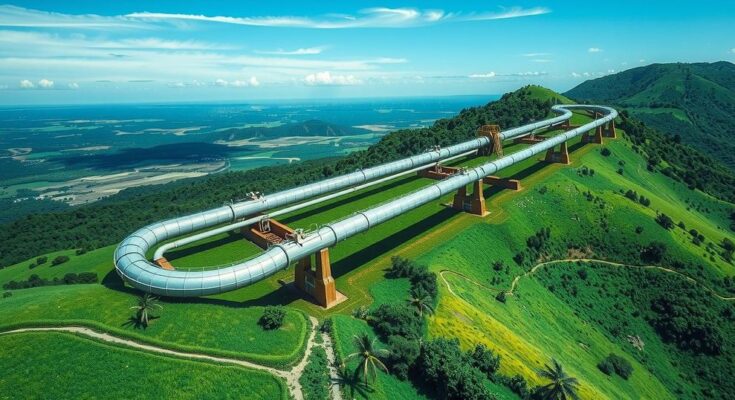Mozambique has signed a US$1.5 billion deal with Zambia to build a gas pipeline, expected to transport 3.5 million tons annually. Announced at the Mozambique Mining and Energy Conference, the project will help reduce road congestion in the Beira Corridor. Alongside this, a modular fuel refinery project is also in the pipeline, signaling growth in Mozambique’s extractive sector, despite some funding uncertainties and ongoing security concerns.
Mozambique has made significant strides in its energy infrastructure by signing a US$1.5 billion pipeline deal with Zambia. The agreement was announced recently by President Daniel Chapo during the 11th Mozambique Mining and Energy Conference (MMEC). This marks a hopeful step towards boosting the energy sector in southern Africa, as reported by the Mozambique news agency AIM.
The pipeline, which will stretch from the coastal city of Beira in Mozambique to Ndola in central Zambia, covers a distance of over 1,000 kilometers. With the capability to transport 3.5 million metric tons of gas annually, the pipeline is anticipated to ease the heavy road traffic along the Beira Corridor, a vital route linking the coastal port to landlocked countries in the region.
However, the specifics regarding funding for the project, including the construction of necessary storage facilities, have not been disclosed. President Chapo has indicated that the commissioning of the pipeline is expected to occur within four years, a timeline that many will watch closely.
In related news, Mozambique’s extractive sector continues to flourish, showcasing a notable 12 percent year-on-year increase in mining activity. Notably, there have been over 117 shipments from the Coral Sul FLNG (floating liquefied natural gas) platform, which is under the operation of the prominent Italian company, Eni.
Chapo also revealed plans for another ambitious project involving a modular fuel refinery to be built by the state-owned fuel company Petromoc in collaboration with Aiteo Eastern E & P Group. Scheduled for implementation within the next 24 months, this facility is expected to process 200,000 barrels per day and store significant quantities of liquid fuel and liquefied petroleum gas (LPG).
The new refinery is designed to produce essential fuels, including petrol, diesel, naphtha, and jet A1 aircraft fuel, catering to both domestic and international markets. Chapo described this initiative as “transformative,” emphasizing its potential to enhance job creation and reduce dependence on imports.
Additionally, Mozambique has strengthened its role as a key supplier of liquefied natural gas (LNG), particularly with the recent approval of a second FLNG platform in the Rovuma Basin. Moreover, progress is being made on two major LNG projects that had been stalled. Notably, TotalEnergies announced that it would soon resume work on a US$20 billion onshore LNG project in northern Mozambique.
This project had faced setbacks in 2021 due to a violent insurgent attack in Cabo Delgado that caused significant disruptions. Despite lingering instability, TotalEnergies CEO Patrick Pouyanné expressed optimism that they aim to restart operations by mid-2025. “The aim is to restart [the project] by mid-2025,” he stated in a recent presentation during the company’s quarterly results.
Another onshore LNG project, spearheaded by ExxonMobil, also looks to return to Mozambique. The company has contracted Italian firm Bonatti to refurbish a base on the Afungi Peninsula, a crucial step in resuming its US$27 billion LNG project. This base will provide housing and operational support for personnel involved in the LNG development efforts, marking yet another significant effort in Mozambique’s growing energy landscape.
The recent agreement between Mozambique and Zambia for a gas pipeline represents a pivotal moment for Mozambique’s energy sector, promising to ease transportation burdens and encourage economic growth. Coupled with other developments, including a new refinery and the resumption of major LNG projects, these initiatives underscore Mozambique’s aim of becoming a cornerstone in the region’s energy landscape. Overall, the future looks bright, albeit with a need for careful management of ongoing security challenges.
Original Source: macaonews.org




